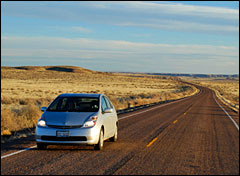Dear Umbra,
Could you help me clear up a rumor about cars? I’ve heard that although hybrids reduce your carbon footprint because they use less gas, the process for mining the nickel in the hybrid batteries produces far more pollution than the process for regular car batteries. So are we really making a difference by buying hybrids? I personally decided to get a more fuel-efficient car and bought a used Honda Fit, which I love. Did I make the right choice?
Kimberly W.
Raleigh, N.C.
Dearest Kimberly,
As long as you’re buying a fuel-efficient, low-emissions vehicle, you’re doing the right thing. That philosophy is broad enough to accommodate all our pocketbooks and typical passenger loads and yet narrow enough to give us some motivational guilt. Of course, small hybrids are the most fuel-efficient vehicles. But sometimes we just don’t buy them — they aren’t the right fit (sorry, couldn’t resist).

Photo: Donna Block
As far as I can tell, the “hybrids ain’t so great” rumors (about the Toyota Prius and Honda Civic Hybrid, mainly) are patently untrue. There was the fabulous urban legend in which Hummers beat Priuses in eco-friendliness over a lifetime, a bit of bogusness propagated by the likes of George Will (and thoroughly debunked, in case you were wondering). And then there’s the rumor about the nickel in hybrid batteries, which is based in good thinking — are we robbing Peter to pay Paul? — but turns out to be similarly deceptive.
The manufacturing process for a Prius is more energy intensive than the process for a non-hybrid of its size. However, according to research from Toyota, the Argonne National Laboratory, and the Rocky Mountain Institute, to name a few, the fuel savings you get in a hybrid more than make up for the initial eco-hit. (For a user-friendly rendition of all the science, check out the analysis in Slate).
There is indeed nickel mining involved in the production of the Prius’ nickel-metal hydride batteries, and nickel mining has nasty impacts. One fun fact you can tease out of the Hummer rumor, though, is that the Hummer’s frame contains twice as much nickel as a Prius frame. Once a Prius begins life on the road, moreover, it requires far less petroleum-related environmental destruction than similar non-hybrid cars. Consider: Your Fit is getting about 32 mpg on a good day, while a Prius or Civic Hybrid gets in the high 40s. (A Hummer, if you’re in need of wincing, gets about 14 mpg.)
In a decent life-cycle analysis, the unique pollutants from battery production, lower fuel usage, and other key automaking components are translated into comparable units and stacked up against each other. Here I defer to my fellow eco-advice columnist, Ask Pablo, who examines a widely respected automobile life-cycle model and compares the Prius, Hummer, Toyota Highlander, and Highlander Hybrid. Despite the battery issue, he concludes that the Prius is indisputably the greenest car, followed by the Highlander Hybrid, the Highlander, and (dead last) the Hummer.
So what should one do about choosing a new car? I’ve been thoroughly enjoying the insights of dear Clark Williams-Derry, a longtime Gristian, on this point. Clark has put much thought into the costs and benefits of hybrids, new cars, and used cars; I highly recommend considering his worthy idea that money saved through buying a non-hybrid used car instead of a more expensive hybrid can be put to use for other environmental protections.
In short, the Prius and Civic Hybrid come out on top in the new/used/hybrid debates. And they should: They have the highest mileage in the gasoline fleet, very low emissions, and great performance. A used car, however, requires no new manufacturing impact, and for that reason it’s also a fabulous choice. A used Prius would be the best of all worlds. Still, the Fit is considered one of the top ten most economical new cars by both Edmunds.com and Consumer Reports — and if the Prius or Civic didn’t exist, it would be considered incredibly fuel-efficient. Use it sparingly and wisely, and you’ll never look back.
Fittingly,
Umbra

